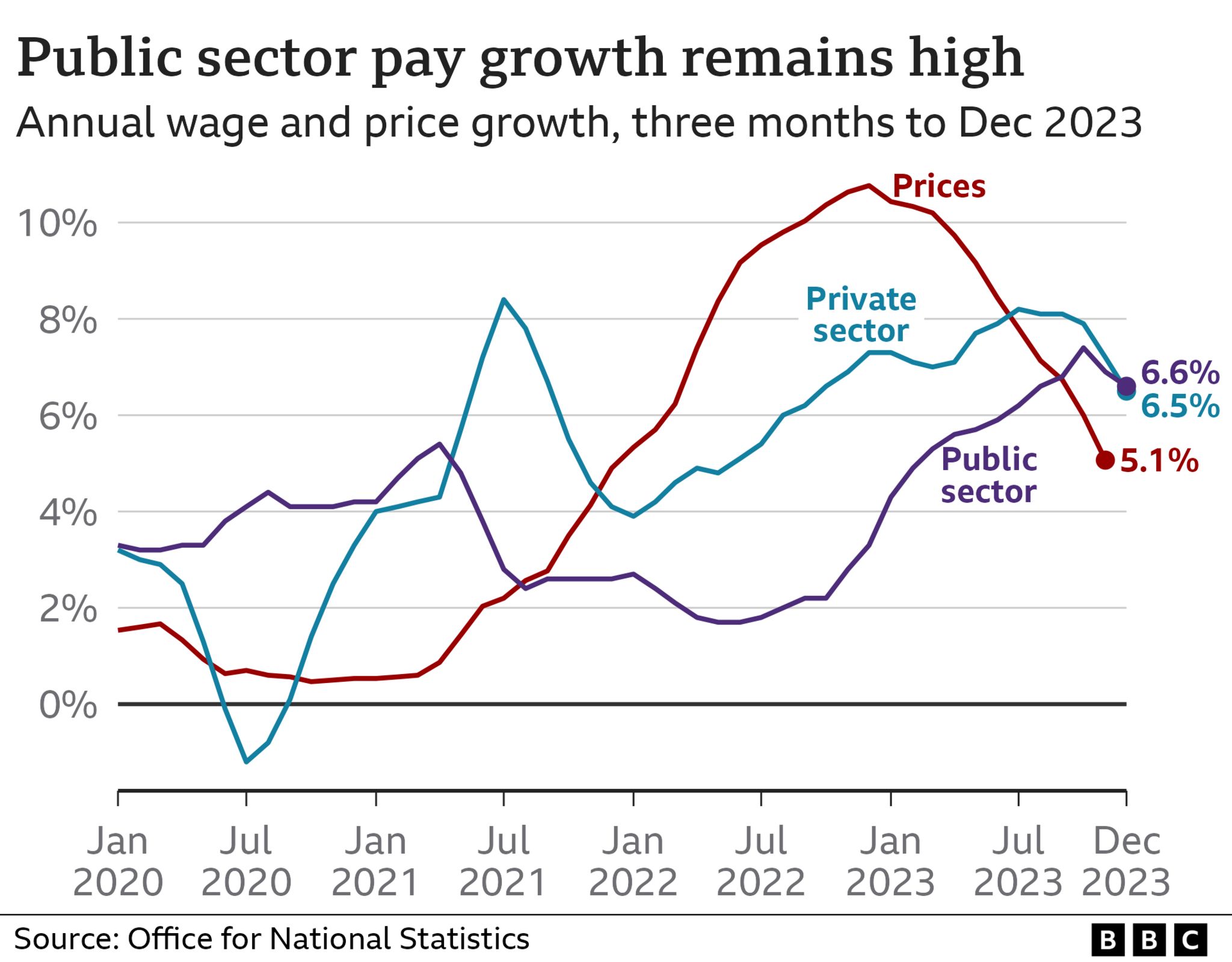
Wage growth slowed again in the UK jobs market but is still outpacing price rises, official figures show.
Pay growth, excluding bonuses, fell sharply from 7.3% to 6.6% in the three months to November.
There are also signs the jobs market is stalling, with the number of vacancies dropping for the 18th time in a row.
Retailers reported the sharpest fall in vacancies despite the sector heading towards the key Christmas trading period.
Several big recruitment companies have recently warned that the jobs market was slowing. Page Group, Hays and Robert Walters said confidence was weak among employers, with Page pointing out that the UK was its worst-performing market with profits down by around a fifth.
Between October and December, the estimated number of vacancies in the UK fell by 49,000 to 934,000, according to the Office for National Statistics (ONS).
But vacancies still remain above levels seen before the Covid pandemic.
Grant Fitzner, chief economist at the ONS, told the BBC's Today programme there were signs the labour market had been "softening somewhat in recent months", adding that the number of employers or businesses reporting recruitment difficulties had "fallen significantly over the past year".
Yael Selfin, chief economist at accountancy firm KPMG UK, said slowing pay growth signalled "further weakness for the labour market ahead", while Neil Carberry, chief executive of the Recruitment and Employment Confederation, said: "The jobs market does now seem to be in a bit of a stand-off with the wider economy, with both employers and candidates waiting to see how the economy develops before committing to new roles."
Ms Selfin said the "unique circumstances" that fuelled pay growth, such as strong demand for workers and higher pay demands to keep pace with the rising cost of living, had "receded in recent months".
She added job vacancies were expected to fall further, which could lead to pay growth falling towards 2% by the end of the year. "This will likely bolster the case for interest rate cuts later this year," she said.
The Bank of England raised interest rates a number of times in a bid to tackle inflation, though it has held them at 5.25% - a 15-year high - in recent months.
Inflation has fallen sharply and financial markets, as well as some economists, have suggested the Bank could cut interest rates soon.
But the Bank will look closely at the fact that wage growth is outpacing price rises, and consider whether an interest rate cut could fuel inflation, which is at 3.9%, almost double the Bank's 2% target.
The ONS said annual public sector pay growth (6.6%) in the three months to November last year overtook wage rises in the private sector (6.5%) for the first time since March 2021.
Overall pay growth peaked at 7.9% in the three months to August last year, the highest it has been for "several decades", according to the ONS's Mr Fitzner.

Chancellor Jeremy Hunt said with inflation falling it was "heartening to see real wages growing for the fifth month in a row".
Liz Kendall, Labour's shadow work and pensions secretary, said the UK remained the only advanced economy with an employment rate still below pre-pandemic levels.
"There are 2.6 million people locked out of work due to long-term sickness - an all-time high that costs them and the taxpayer," she said, adding that Labour would "tackle the root causes of economic inactivity".
The latest figures showed the unemployment rate was largely unchanged at 4.2%.
But Mr Fitzner said: "It is worth pointing out that although we haven't seen much change in the unemployment rate in recent months, it is higher than it was this time last year, so there has been some softening in the labour market as reflected by the unemployment rate and reflected by job vacancies."

How are you coping with the cost of living? Share your experiences by emailing haveyoursay@bbc.co.uk.
Please include a contact number if you are willing to speak to a BBC journalist. You can also get in touch in the following ways:
- WhatsApp: +44 7756 165803
- Tweet: @BBC_HaveYourSay
- Upload pictures or video
- Please read our terms & conditions and privacy policy
If you are reading this page and can't see the form you will need to visit the mobile version of the BBC website to submit your question or comment or you can email us at HaveYourSay@bbc.co.uk. Please include your name, age and location with any submission.
Related Topics
https://news.google.com/rss/articles/CBMiLGh0dHBzOi8vd3d3LmJiYy5jby51ay9uZXdzL2J1c2luZXNzLTY3OTgzMjEy0gEwaHR0cHM6Ly93d3cuYmJjLmNvLnVrL25ld3MvYnVzaW5lc3MtNjc5ODMyMTIuYW1w?oc=5
2024-01-16 08:50:18Z
CBMiLGh0dHBzOi8vd3d3LmJiYy5jby51ay9uZXdzL2J1c2luZXNzLTY3OTgzMjEy0gEwaHR0cHM6Ly93d3cuYmJjLmNvLnVrL25ld3MvYnVzaW5lc3MtNjc5ODMyMTIuYW1w
Tidak ada komentar:
Posting Komentar